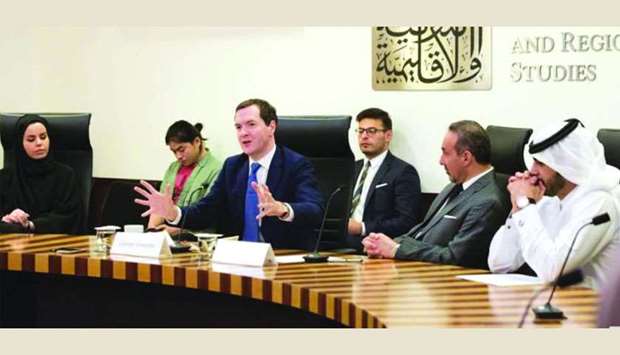The Centre for International and Regional Studies (CIRS) at Georgetown University in Qatar has positively contributed to Qatar in its quest for evolving as a knowledge-based nation, director Dr Mehran Kamrava said.
"We have also emerged as a major think tank helping in the development of an intellectual community," he told Gulf Times.
The CIRS conducted research in about 34 topics and published 30 books in addition to a number of research publications, Dr Kamrava explained.
Established in 2007, the CIRS has completed a decade of research activities, emerging as a leading think tank in the country.
“Our research projects focus on several areas. So far, we have had about 34 research initiatives including food security, identity crisis, political issues, among others.We study topics that have not been studied before, or to which we can contribute original scholarship, and all our research initiatives leads to publications,” Dr Kamrava said.
“We have published 30 books so far. These books are published by top university presses such as Columbia University Press, Cornell University Press, Oxford University Press and many others. The unique aspect to us is that we have been able to do in Qatar what we could not have done in the US or anywhere else,” he explained.

Dr Kamrava who joined the CIRS as its first director in 2007 said that over the last 10 years, the centre has helped in promoting a robust and vibrant research culture in Qatar.
“I came here thinking that I knew the Middle East well and I discovered that I knew only a little. It was an intellectual discovery and a journey of learning for me. The entire Gulf has turned out to be the centre of gravity for the Middle East,” he recalled.
“Qatar is in the midst of many dynamic changes and these changes have started from 1995 when His Highness, Father Amir, Sheikh Hamad bin Khalifa al-Thani became the Amir and Al Jazeera being established in 1996. These are some fundamental changes and highly progressive. These developments are not just changes but outcomes of a visionary leadership, making the country getting ready for a post-oil economy; a knowledge based one,” highlighted Dr Kamrava.
According to the official, CIRS focuses on five areas: Student Development; Faculty Engagement; Public Affairs Programmes; Research and Scholarship and Publications.”
“Student development is an important component of our programme. We have a deep programme for research, research methodology as well as research presentation in addition to what they get in the classroom,” noted the director.
“As for faculty engagement, we have a special collaboration. We provide opportunities for one faculty each from Georgetown and Qatar University for a one-year research fellowship. We have had it for six years now. They publish their research findings and present these to the public under the auspices of CIRS. This has been an incredibly fruitful collaboration between Georgetown and Qatar University,” he described.
Dr Kamarava stated that CIRS conducted many talks with some of the most renowned figures in the world of academia, journalism, and public policy under the public affairs programme.
“Last 10 years we have evolved. Our mission and scope of activities were evolved. We continue to evolve in our studies and reach new horizons. We have learned from many of the best practices of others and we have made adjustment to become better, and the continuous evolution will go on. We want to become more productive and more focused on the region and beyond,” he added.


